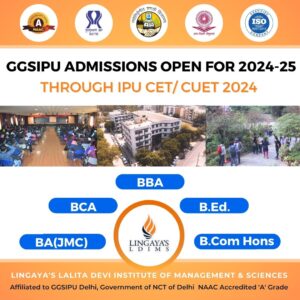Bachelor of Arts - Journalism and Mass Communication
BA(JMC) program at LLDIMS is a 3-year degree in affiliation with GGSIPU – Students build a skillset to pursue career in journalism and mass communication.
- 3 Years / Onsite
- Intake: Jul / 120 students
Overview
A Bachelor of Arts in BA JMC program is an undergraduate degree program focusing on the skills and knowledge required to work as a Journalist. Journalism and Mass Communications are all-surrounding, constituting and affecting how we navigate and make sense of the world, distribute information and shape our culture with their representations, stories, programmes, formats, exhibitions, repositories and data.
The program aims to provide students with the knowledge and skills needed to work as a journalist and develop the critical thinking, communication and analytical skills essential in any profession. With a focus on media theory and media practices, the journalism and media program aims to provide students with first-hand experience and intensive training. The department commands well-established infrastructure such as Radio Labs, Television Studio, Editing Labs, Communication Lab, IT and creative hubs. Today, the department remains strongly interdisciplinary. Our research faculty comes from various diverse streams, including Communication, Media, Public Relations, Corporate, International relations, Advertising, Television and Radio production. And the professional journalism faculties include prize-winning innovators in various domains.
In affiliation with Guru Gobind Singh Indraprastha University, New Delhi, LLDIMS offers Bachelor’s degree in Journalism and Mass Communication – BA (JMC). The program caters to 150 students in total, 120 in the morning shift and 30 in the evening.
Career Opportunities
We’ve trained students who have reshaped their fields, some of the nation’s most influential journalists, and leaders in various areas over the years. The department taught students how to think critically about the world around them, preparing them for careers in the media, corporate, cultural institutions, and academia, to name a few. In the top national and international organizations, the department has produced some well-known and hardworking anchors, independent filmmakers, actors, copywriters, producers, reporters, graphic artists, radio jockeys, event managers, advertising professionals, and public relations officers.
Program Learning Outcomes
The programme covers communication techniques and technologies that shape who we are, how we govern ourselves and what kinds of cultures we inhabit. The curriculum of the program develops acumen and skills such as:
- News writing and reporting: students will learn how to gather, write, and report on news stories and write in a clear and concise style for different platforms such as print, television, and digital media.
- Journalism ethics and law: students will learn about the ethical and legal considerations involved in journalism, including issues such as freedom of the press, privacy, and defamation.
- Media history and theory: students will learn about the historical development of the media, the role of journalism in society, and various theories of communication and media studies.
- Multimedia journalism: students will learn how to produce content for different platforms, including photography, video and audio production, and social media.
- Research and interviewing techniques: students will learn how to conduct research and interviews and verify information and sources.
- Production and editing: students will learn how to edit and produce content and use various software and technologies to create content.
- Specialised Journalism: Depending on their interest and institute, students can choose specialised fields like Sports journalism, Data journalism, Business journalism, and Environmental journalism.
- International and cultural awareness: understanding the importance of cultural and linguistic sensitivity and knowledge of global events and issues is an essential aspect of journalism education.
Throughout the program, students will also have the opportunity to gain practical experience through internships, fieldwork, and student publications.
Programme syllabus
Faculty

Dr. Saleen Javed
Head of Department, Associate Professor

Dr.Sheweta Gaur
Associate Professor

Ms. Mansi Chopra
Assistant Professor

Mr. Hardeep Bhakal
Assistant Professor

Mr.Sourabh Shukla
Assistant Professor






